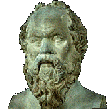Handout on the Apology [Socrates’ Speech of Defense], by Plato
See Apology 36b-c: Socrates encapsulates his life and mission. "In my life, I decided not to keep a low profile and be quiet. Neglecting what most people value – things like making money and managing business and leading armies and taking part in political cabals – I thought I was too honest a man to be safe if I entered into such affairs… Instead, I took it upon myself to bestow the greatest advantage on each one of you separately … trying to advise each one of you how to become as good and judicious as possible…"
Also see 30e: "I was sent to this city by god, as if to a haughty and enormous horse that had become sluggish because of its great size and needed a gadfly to awake it." [Read further what Socrates goes on to say in this passage.]
Structure and Synopsis of the Apology
17a-19a: Socrates’ Prologue. He claims that he is not a good speaker. [Are you convinced by this?] He seeks the truth whereas his accusers have been spreading lies. Who are his first accusers? He must fight against shadows. He is a law-abiding citizen. [Remember this also when we read the Crito next time.]
19b-20c: Socrates’ erstwhile accusers. Comedians and Sophists. How does Socrates appear in the eyes of most Athenians? Why?
20c-23b: The opinionated self-proclaimed wise men of Athens and Socrates’ mission as announced by the Delphic Oracle. Why did Socrates set out to prove the oracle false? What was the Oracle’s true meaning according to Socrates? What does Socrates’ wisdom consist in? Why did he arouse hostility toward him?
23e-24c: The Present Accusation against Socrates. Motives?
24d-28a: Socrates cross-examines Meletus. The issue of corruption. How does Socrates rebut the charge of impiety?
28a-30c: Socrates’ integrity and fortitude. Socrates’ virtues. Can you see Socrates as a hero? Truth, Death, and the Soul. See, e.g., 29d: "You, Athenians, citizens of the greatest city and the one most celebrated for its wisdom and power, you are not ashamed to devote your time to increasing your wealth and reputation and fame as much as possible, while knowledge, truth and the way to better your soul, you don't care and don't give a damn about it!" See also 30b: Socrates’ mission is to encourage and prod Athenians to take care of their souls. [What does he mean by this? What does health of the soul mean? How is this different from contemporary psychotherapy? How is it different from Judeo-Christian morality?]
[Did you notice how frequently these words appear in the Apology? For instance, we find the word ‘soul’ at 29e, 30b, 40c… The words truth, true, and truly are extremely common: e.g. see 17a, 17e, 18b, 19e, 20d, 22a, 22b, 23b, 23d, 24a, 27e, 28a, 31c, 32a, 33b, 34b, 36d, 39b, 40e, 41a, 41c… [Some of these occurrences are sometimes lost in translation.] Why are these notions important for Socrates? Why are they important for philosophy? How are they related to each other? Are they related to justice and how?]
30c-31c: The city and Socrates as god-sent gadfly. Socrates’ poverty. Socrates as a busybody. Do you think that Socrates is an ascetic? Socrates’ services to the city and his mission.
31c-33a: Socrates’ daimonion – his divine inner voice. Significance of this for morality? How is Socrates’ inner voice different – if it is different – from conscience?
33b-35e: Socrates’ justice and piety and his salubrious influence on those around him.
35e-38b: Socrates’ Second Speech. Why can’t he accept the sentence that has been meted out? His proposal for a lenient sentence. What does he suggest? Does Socrates appear arrogant to you? Why? Why not?
38c-42a: Socrates’ Third Speech. Socrates’ reasons for sticking to his guns. His fearlessness and courage in the face of death. [See, above, on Socrates as a hero. What kind of a heroic figure would he cut? What are his virtues?] Is Socrates courting death? What are the reasons he gives for his defiance of death? His expectations about an after-life. Is he clear about this? Justice and truth.
Links
